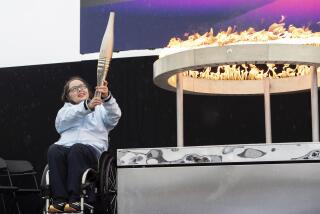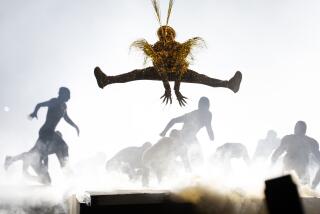London Olympics: 2012 Games begin with whimsical opening ceremony
- Share via
LONDON — In a city that knows how to do ceremony, from hoary rituals formalized in the Middle Ages to celebrating the Queen’s Diamond Jubilee last month partly through the Twitter feed @BritishMonarchy, an atmosphere of whimsy and party won out over pomp and circumstance during an Olympic opening ceremony that allowed an economically beleaguered Britain to pat itself on the back.
Starting from his conviction that Britain “rebooted human existence” with the Industrial Revolution, director Danny Boyle called the entertainment piece of the nearly four-hour ceremony Friday night a “celebration of the creativity, exuberance and, above all, the generosity of the British people.”
It was in the spirit of such generosity that the organizers chose not a single renowned Olympian to light the caldron that will burn until Aug. 12 but seven young athletes who embody the London Games’ idealistic motto and hope to “inspire a generation.”
With 260 British Olympic medalists joining them, the seven young athletes touched torches to copper petals that rose to form a caldron at the center of the stadium floor. It will be moved to another position before the track and field events begin next Friday.
Before the torch arrived inside the Olympic Stadium in the hands of five-time British rowing gold medalist Steven Redgrave, Boyle had leavened the proceedings in a variety of ways, so the ceremony took on the overall air of frivolity that usually prevails at the closing rather than the opening.
The Sex Pistols’ sardonic “God Save the Queen” played in the countdown to the official start of the extravaganza — well before Queen Elizabeth II arrived. Rowan Atkinson, a.k.a. “Mr. Bean,” hammed it up with the London Symphony Orchestra for the “Chariots of Fire” theme and did a Rosie Ruiz turn by jumping into a car in a video send-up of the movie’s famous beach running scene.
The 86-year-old queen herself took part in a video skit with Daniel Craig, the most recent actor to portray James Bond, in which she and Bond entered the stadium by “jumping” from a helicopter.
The ceremony could not have been more of a contrast from Beijing’s four years ago, replacing Chinese militaristic precision with British fancifulness. Hospital beds for a scene honoring the National Health Service were rolling onto the stage while a children’s choir sang the British national anthem, “God Save the Queen.”
A pastoral tableau of this “green and pleasant land,” complete with sheep, cows, thatched roof houses (and, on cue, a couple of brief rain showers) gave way to belching smokestacks and pounding music announcing the Industrial Revolution and the advent of modernity, with its wonder and terror.
As actors on the stadium floor depicted the forging of one ring, four others floated in like UFOs, linking into the five Olympic rings and setting off a blaze of fireworks. That was followed by a long, loud tribute to British pop (done with music and video at the dizzying pace of the Twitter generation), Kenneth Branagh as Caliban in Shakespeare’s “The Tempest,” JK Rowling reading “Peter Pan,” Lord Voldemort being conquered by a pack of Mary Poppinses, and an appearance by Tim Berners-Lee, the English scientist who invented the World Wide Web.
Part hodgepodge, part head-shaker, respectful of tradition and given to irreverent pokes in the eye, all this was seen live by billions of viewers worldwide, with the exception of the United States, where NBC refused to embrace modernity and held the telecast until prime time.
While there were two solemn moments of remembrance, one for those killed in conflicts, neither made reference to the 11 Israeli athletes and coaches murdered by Palestinian terrorists at the 1972 Munich Olympics.
For the first time, the parade of athletes included a woman in every country’s team. Two of the three Muslim nations that finally included women, Brunei and Qatar, marked the occasion with female flag bearers. The third, Saudi Arabia, chose a man.
The British team wore white uniforms with gold trim, a touch the ancient Greeks who began the Olympics would have seen as hubris.
Two-time Olympic fencing champion Mariel Zagunis bore the flag for the United States team while Muhammad Ali, who lit the caldron at the 1996 Olympics, was among the nine people who carried the Olympic flag. Because Ali was too infirm to walk half the stadium with the flag, he waited for the others at the foot of the hill where it was raised.
Queen Elizabeth declared open the third Summer Games to be held in London, Paul McCartney led the crowd in a “Hey Jude” singalong, and the world’s largest harmonically tuned bell tolled intermittently as the 80,000-seat stadium emptied.
The only thing missing was a few choruses of “Rule, Britannia.”
More to Read
Go beyond the scoreboard
Get the latest on L.A.'s teams in the daily Sports Report newsletter.
You may occasionally receive promotional content from the Los Angeles Times.






